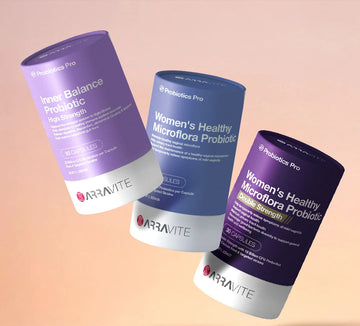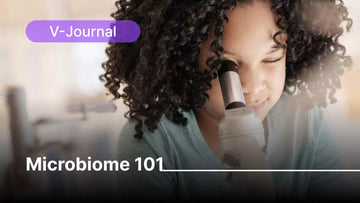While antibiotics are essential for treating infections, their impact extends beyond targeting harmful bacteria. Unfortunately, they can also disrupt the balance of beneficial bacteria within the intestines. This disruption may lead to digestive issues, increased susceptibility to illness, and potentially diminished antibiotic effectiveness over time. Many people ignore the effects of antibiotics, which is why it is necessary to restore good bacteria with probiotics.
Probiotics are beneficial microorganisms that are fundamental components of healthy intestines. Findings from research show that the use of probiotics helps prevent antibiotic-associated diarrhoea (AAD) by 51%. (Source: Probiotics for the Prevention of Antibiotic-Associated Diarrhea)
Now, let’s explore 10 interesting facts about antibiotics and probiotics.
10 Facts About Antibiotics and Probiotics
Here are 10 critical facts about antibiotics and probiotics and how they work. These facts also explain why and how you can take probiotics with antibiotics:
1. Antibiotics Kill Both Good and Bad Bacteria
Antibiotics are effective in treating infections in the body. But we must also be aware of their indiscriminate use, which will decimate the indigenous flora of the intestine. This results in bloating, diarrhoea, and a lower capability to fight infections. Probiotics can play a significant role in restoring balance within the gut bacteria and improving digestive health.
2. Overuse of Antibiotics Leads to Resistance
Taking antibiotics too freely makes bacteria more resistant to the medication and harder to kill. This situation led to antibiotic-resistant bacteria. According to The Lancet, 1.27 million people died from antibiotic-resistant-related infections in 2019. (Source: The Lancet)
The evolving bacteria eventually grew unresponsive to medication. One way to mitigate this problem is by utilizing probiotics, which can lessen the reliance on antibiotics.
3. Probiotics Reduce Antibiotic Side Effects
Antibiotic usage often comes with bloating, diarrhoea, and general stomach pain. Regular probiotics restore the natural balance of good bacteria in your gastrointestinal tract. It accelerates the recovery rate of your stomach after antibiotic treatment.
4. How to Take Probiotics with Antibiotics?
Probiotics work best if you take them a few hours after you take antibiotics. The antibiotics can kill the probiotics if you take them simultaneously. But if you wait a couple of hours, the probiotics have a better chance to live and help your body.
Giving the probiotics time to settle in your intestines helps them grow and enables you to digest your food better. This easy trick can help your intestines get healthy faster.
5. Not All Probiotics Are the Same
Different probiotics do different things. Some are better for helping your intestines after you take antibiotics. For example, lactobacillus acidophilus la1 (LA1) is suitable for helping you digest food. Meanwhile, bifidobacterium helps strengthen your body against sickness. Picking the right probiotic is very important.
Also, while men and women need probiotics, probiotic supplements are generally different for men and women. Women’s probiotics supplements like the ARRAVITE’s Women’s Healthy Microflora Probiotic htarget gut and vaginal microflora.
6. Fermented Foods Are Natural Probiotics
You can get probiotics naturally in foods like yoghurt and kimchi. These foods help grow good bacteria, which makes your stomach work better. Eating these foods often can protect you from stomach problems caused by antibiotics. Adding them to your meals is a great way to help your gut stay healthy.
7. Probiotics Strengthen the Immune System
Most of the cells that fight off sickness are in your stomach area. This area is called the gut-associated lymphoid tissue (GALT). (Source: PubMed) When your gut is healthy, your body can fight infections better. Probiotics help your body’s defence system by balancing the good and bad bacteria.
8. Probiotics Can Reduce the Need for Antibiotics
The Journal of Clinical Gastroenterology states that probiotics help prevent infections from antibiotics by improving the immune system and supporting gut functioning. If your stomach is healthy, your body will naturally fight off infections. This means you might not need antibiotics as often.
9. Prebiotic Fibre Helps Probiotics Work Better
Prebiotic fibre is the food for the good bacteria and nourishes them in your gut, making it easier for them to grow. Bananas, onions, and garlic have prebiotic fibres that aid probiotics. When you consume prebiotics and probiotics simultaneously, their effectiveness becomes double. It assists in restoring gut balance faster after antibiotic usage.
10. Post-antibiotic Care is Crucial
Gut care is essential in the post-antibiotic treatment phase. Your gut takes time to recover after finishing antibiotics. Therefore, use probiotics for no less than two weeks. It will help replenish the good bacteria that were depleted. The use of premium probiotic supplements can significantly improve the recovery time.
Restore Balance with Probiotic Supplements
While antibiotics may be highly effective in the short run, their consumption can negatively affect your gut health balance. Probiotics can quickly heal your body and rebuild natural immunity. ARRAVITE probiotics supplements are clinically tested strains for women to restore gut balance, enhance digestion, support vaginal health and boost skin health.
Though beneficial probiotic strains are generally safe, it’s always best to consult a healthcare professional to choose the right ones for your needs.
References:
Kopacz K, Phadtare S. Probiotics for the Prevention of Antibiotic-Associated Diarrhea. Healthcare (Basel). 2022 Aug 2;10(8):1450. doi: 10.3390/healthcare10081450. PMID: 36011108; PMCID: PMC9408191.
Kim CS, Jung MH, Choi EY, Shin DM. Probiotic supplementation has sex-dependent effects on immune responses in association with the gut microbiota in community-dwelling older adults: a randomized, double-blind, placebo-controlled, multicenter trial. Nutr Res Pract. 2023 Oct;17(5):883-898. doi: 10.4162/nrp.2023.17.5.883. Epub 2023 May 26. PMID: 37780220; PMCID: PMC10522805.
Donaldson DS, Else KJ, Mabbott NA. The Gut-Associated Lymphoid Tissues in the Small Intestine, Not the Large Intestine, Play a Major Role in Oral Prion Disease Pathogenesis. J Virol. 2015 Sep;89(18):9532-47. doi: 10.1128/JVI.01544-15. Epub 2015 Jul 8. PMID: 26157121; PMCID: PMC4542385.
Yan F, Polk DB. Probiotics and immune health. Curr Opin Gastroenterol. 2011 Oct;27(6):496-501. doi: 10.1097/MOG.0b013e32834baa4d. PMID: 21897224; PMCID: PMC4006993.






